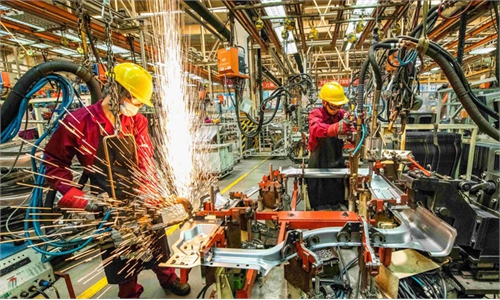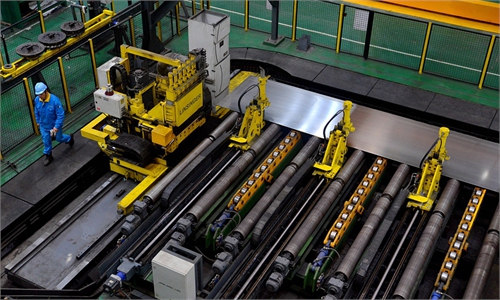Caixin services PMI stands at 56.3 in December, Chinese economy expansion continues

Visitors shop at a duty-free shopping mall when three new duty-free stores are opened in South China's Hainan Province on Wednesday. There are now seven duty-free stores on the island, a relief for Chinese shoppers who are unable to purchase duty-free goods abroad due to the COVID-19 pandemic. Photo: cnsphoto
Caixin services PMI, which gauges China's services sector activity, stood at 56.3 in December. Although down 1.5 percentage points from November's 10-year high, the index remains well above the line that separates expansion from contraction and at its highest level in the past decade, which analysts said that China's post-COVID-19 recovery is continuing.
Wang Jingwen, a macroeconomics analyst and financial freelancer, said that the negative impact of the epidemic on the domestic economy has further subsided, and the post-epidemic economic recovery is expected to continue for several months. Considering the low base in the first half of 2020, macroeconomic indicators over the next six months this year will be strong on a yearly basis.
Domestic service demand continued to expand, with the new orders index in December in the expansion range for the eighth consecutive month, but at a slightly slower pace than the previous two months, according to statistics released by Caixin on Wednesday.
Overseas demand in December recorded modest growth, falling back from November when new export orders rose at their fastest pace in a year and a half. According to the survey samples, the recent resurgence of the epidemic in major export markets has inhibited the growth of overseas business.
Employment in the service sector has continued to improve, and the buoyant market has contributed to a fifth consecutive month of expansion in the service sector, but the expansion has slowed slightly. As a result, the service sector backlog is slightly lower than in November 2020.
"On a regular basis, economic activity in December is usually weaker than in November, with an average decline of 0.16 percentage points," Wang told the Global Times on Wednesday, adding that with the marginal impact of the epidemic weakening and the COVID-19 vaccines entering the fast track, the resumption of production in other countries will accelerate, thus the growth rate of China's exports will inevitably slow down accordingly.
Zhang Wei, chief research fellow of macroeconomics at Kunlun Health Insurance, told the Global Times on Wednesday that it is necessary to pay close attention to cost increases from the rapid rise of raw material prices and the negative impact on employment. Cost pressures will lead companies to be relatively cautious about recruiting more employees.
Analysts also noted that due to localized outbreaks of the epidemic in China recently, prevention and control measures in many cities have been tightened. In particular, the flow of people during the Spring Festival in February will also be affected, which will weigh on consumption.



